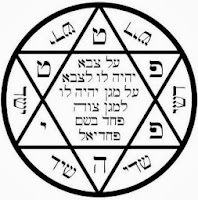(More to follow)
Monday, March 26, 2012
The "Name of Seventy-two Names": A Biblical Spin-off - Part 2
Having established the seventy-two segments of the “Shem Vayisa Vayet,” we are now faced with the issue of their actual verbal expression, of which there are a number of different ways in existence. Moses Zacutto addressed some of these in his “Shorshei ha-Shemot,” and offered the following vocalisations of the “Name of Seventy-two Names”:Excepting the following variances: (14) Mavah, (20) Fehil, (21) Nalecha, (22) Y’yay’, (24) Chahu, (26) Ha’i’a, (36) M’nad, (37) An’, (38) Ch’am, (42) Miyach, (43) V’val, (47) ’shal, (51) Hachash, (53) Nina, (54) Niyat, (56) P’vi, (57) N’mam, (58) Yiyal, (61) Vamav, (63) Anu, and (69) R’ei, the vocalisations Zacutto listed in his “Shorshei ha-Shemot” match those presented by Moses Cordovero in “Pardes Rimmonim.”A variety of ways have been suggested as far as the vocalisation of this remarkable Divine Name is concerned. It has been proposed that each portion of the “Name of Seventy-two Names” should be vocalised with the vowels segol–sh’va–segol. Accordingly the intonation of the seventy-two Names would be VeH’Ve, YeL’Ye, SeY’Te, EL’Me, etc. In this instance the vocalisation of the “Shem Vayisa Vayet” is aligned with the vowels of  (Eh’yeh), which is said to greatly increase its power.In another instance, employing this Name as a meditation device, Abraham Abulafia, asserted each letter comprising the “Name of Seventy-two Names” should be vocalised with the vowel directly associated with the name of each letter, e.g.
(Eh’yeh), which is said to greatly increase its power.In another instance, employing this Name as a meditation device, Abraham Abulafia, asserted each letter comprising the “Name of Seventy-two Names” should be vocalised with the vowel directly associated with the name of each letter, e.g.  (Alef) is uttered “ah”;
(Alef) is uttered “ah”;  (Bet) is pronounced “Beh”;
(Bet) is pronounced “Beh”;  (Gimel) is voiced “Gih”; etc. Other variances remain in a number of manuscripts and publications dealing with the “Name of Seventy-Two Names,” however, some forty years ago I was taught to enunciate the “Shem Vayisa Vayet” in the following manner, which is effective, powerful and easily memorised:
(Gimel) is voiced “Gih”; etc. Other variances remain in a number of manuscripts and publications dealing with the “Name of Seventy-Two Names,” however, some forty years ago I was taught to enunciate the “Shem Vayisa Vayet” in the following manner, which is effective, powerful and easily memorised:
Subscribe to:
Post Comments (Atom)























No comments:
Post a Comment